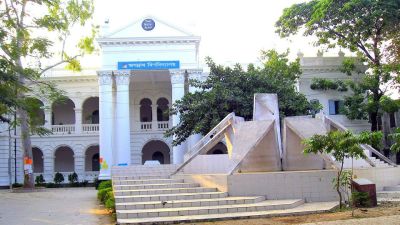Jagannath University: Difference between revisions
(Content Updated.) |
No edit summary |
||
| (2 intermediate revisions by the same user not shown) | |||
| Line 1: | Line 1: | ||
'''Jagannath University''' established through upgrading the Jagannath College of Dhaka under the Jagannath Univesity Act (No 28) enacted by the parliament in 2005. Academic activities of Jagannath University began from the 2005-2006 session with 26 thousand students of 22 departments under four faculties already enrolled in the erstwhile [[Jagannath College|jagannath college]] | '''Jagannath University''' established through upgrading the Jagannath College of Dhaka under the Jagannath Univesity Act (No 28) enacted by the parliament in 2005. Academic activities of Jagannath University began from the 2005-2006 session with 26 thousand students of 22 departments under four faculties already enrolled in the erstwhile [[Jagannath College|jagannath college]]. | ||
[[Image: | [[Image:jagannathuniversity.jpg|right|thumbnail|400px|Jagannath University]] | ||
The area of University campus is more than eleven acres having | The area of the University campus is more than eleven acres having ten buildings including Administrative Block, Arts Faculty Building, Social Science Building, Language Martyr Rafiq Building, newly built 13-storeyed Building and some other structures. The University has also a Shahid Minar and a Sculpture on 71-Independent War. Professor Dr. Sirajul Islam Khan was the first Vice-Chancellor of this University. The present Vice-Chancellor is Professor Dr. Md. Imdadul Haque. Currently, the university has 6 faculties, 36 departments, and 2 institutes. 20 thousand students are now studying in this university. The departments under the Faculty of Arts are: Bengali, English, History, Islamic History and Culture, Islamic Studies, Philosophy, Music, Fine Arts and Drama. Physics, Chemistry, Statistics, Mathematics, and Computer Science and Engineering departments are included in the Faculty of Science. The Faculty of Social Science has the following departments: Political Science, Economics, Sociology, Social Work, Mass Communication and Journalism, Anthropology, Public Administration, and Film and Television. Faculty of Business Administration comprises of Accounting and Information Systems, Management Studies, Finance and Marketing departments. Faculty of Law has the Department of Law and Department of Land Management & Law, while the Faculty of Life & Earth Sciences comprises of Botany, Zoology, Geography and Environment, Psychology, Pharmacy, Microbiology, Biochemistry and Molecular Biology, and Genetic Engineering and Biotechnology. There are two institutes: Institute of Education and Research, and Institute of Modern Languages. The University has 680 full time teachers including 106 full Professors, 160 Associate Professors, 338 Assistant Professors and 76 Lecturers. There is a school named Pogose Laboratory School in the university campus. The central library of the university is located in the new multistoried building. It has 25,000 books, local and foreign journals and Internet facilities. Besides that, research journals are being published separately from each faculty. The university does not have any residential facility for teachers and employee, but they enjoy transportation facilities. For female students there is only one residential hostel: Bangamata Sheikh Fazilatunnesa Mujib hall located at Banglabazar. 20 October is celebrated as the University Day every year. The university becomes the cultural centre of the old Dhaka by organizing different cultural activities, especially Pohela Boishakh (Bengali New Year). [Md. Nure Alam Abdullah] | ||
The central library of the university is located in the new multistoried building. It has | |||
''See also'' [[Jagannath College|jagannath college]]. | ''See also'' [[Jagannath College|jagannath college]]. | ||
Latest revision as of 14:39, 16 October 2023
Jagannath University established through upgrading the Jagannath College of Dhaka under the Jagannath Univesity Act (No 28) enacted by the parliament in 2005. Academic activities of Jagannath University began from the 2005-2006 session with 26 thousand students of 22 departments under four faculties already enrolled in the erstwhile jagannath college.

The area of the University campus is more than eleven acres having ten buildings including Administrative Block, Arts Faculty Building, Social Science Building, Language Martyr Rafiq Building, newly built 13-storeyed Building and some other structures. The University has also a Shahid Minar and a Sculpture on 71-Independent War. Professor Dr. Sirajul Islam Khan was the first Vice-Chancellor of this University. The present Vice-Chancellor is Professor Dr. Md. Imdadul Haque. Currently, the university has 6 faculties, 36 departments, and 2 institutes. 20 thousand students are now studying in this university. The departments under the Faculty of Arts are: Bengali, English, History, Islamic History and Culture, Islamic Studies, Philosophy, Music, Fine Arts and Drama. Physics, Chemistry, Statistics, Mathematics, and Computer Science and Engineering departments are included in the Faculty of Science. The Faculty of Social Science has the following departments: Political Science, Economics, Sociology, Social Work, Mass Communication and Journalism, Anthropology, Public Administration, and Film and Television. Faculty of Business Administration comprises of Accounting and Information Systems, Management Studies, Finance and Marketing departments. Faculty of Law has the Department of Law and Department of Land Management & Law, while the Faculty of Life & Earth Sciences comprises of Botany, Zoology, Geography and Environment, Psychology, Pharmacy, Microbiology, Biochemistry and Molecular Biology, and Genetic Engineering and Biotechnology. There are two institutes: Institute of Education and Research, and Institute of Modern Languages. The University has 680 full time teachers including 106 full Professors, 160 Associate Professors, 338 Assistant Professors and 76 Lecturers. There is a school named Pogose Laboratory School in the university campus. The central library of the university is located in the new multistoried building. It has 25,000 books, local and foreign journals and Internet facilities. Besides that, research journals are being published separately from each faculty. The university does not have any residential facility for teachers and employee, but they enjoy transportation facilities. For female students there is only one residential hostel: Bangamata Sheikh Fazilatunnesa Mujib hall located at Banglabazar. 20 October is celebrated as the University Day every year. The university becomes the cultural centre of the old Dhaka by organizing different cultural activities, especially Pohela Boishakh (Bengali New Year). [Md. Nure Alam Abdullah]
See also jagannath college.
